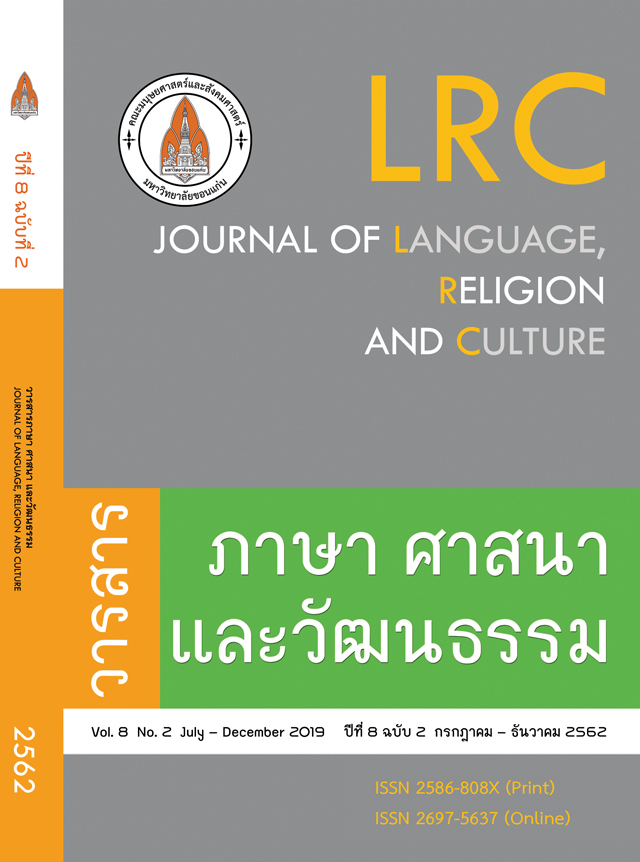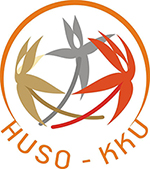ปัจจัยที่มีอิทธิพลต่อการพัฒนาสื่อการเรียนรู้ภาษาอังกฤษเพื่อนำเที่ยวที่วัดหนองแวง ; Influential Factors for Developing English Learning Material for Tour Guides at Wat Nong Wang
Keywords:
การวิเคราะห์ความต้องการ, ภาษาอังกฤษเพื่อวัตถุประสงค์เฉพาะ, การท่องเที่ยว, การพัฒนาแบบเรียน, needs analysis, English for specific purposes, tourism, material developmentAbstract
บทคัดย่อ
วัตถุประสงค์ของการศึกษาในครั้งนี้คือ เพื่อเป็นการวางโครงร่างการออกแบบและการพัฒนาแบบเรียนรู้ภาษาอังกฤษเพื่อการท่องเที่ยว งานวิจัยเรื่องนี้อาศัยทฤษฎีการวิเคราะห์ความต้องการ (Needs analysis) ซึ่งเป็นการระบุประเด็นที่ผู้เรียนจำเป็นต้องศึกษาเพื่อที่จะส่งผลให้ประสบผลสำเร็จต่อการปฏิบัติหน้าที่ในสถานการณ์ต่าง ๆ หรือเพื่อให้บรรลุเป้าหมายที่ต้องการ (Target Needs) (Hutchison & Waters, 1987) ผู้วิจัยได้เลือกวัดหนองแวงเพื่อเป็นกรณีศึกษาของงานวิจัยชิ้นนี้ และมีผู้เข้าร่วมงานวิจัยทั้งหมด 4 ท่าน ซึ่งประกอบอาชีพมัคคุเทศก์และนำเที่ยวที่วัดหนองแวงอยู่บ่อยครั้ง เครื่องมือที่ใช้ในงานวิจัยมีทั้งหมด 3 ชิ้น ดังต่อไปนี้ (1) แบบสอบถาม มีไว้เพื่อค้นหาคำตอบเกี่ยวกับลักษณะที่จำเป็นต่อการเป็นมัคคุเทศก์ (2) การบันทึกเสียง ใช้ในการวิเคราะห์หาคำศัพท์เฉพาะที่มัคคุเทศก์ควรทราบในการนำเที่ยวที่วัดหนองแวง (3) การสัมภาษณ์แบบโครงสร้าง ใช้ในการพิจารณาถึงข้อมูลที่จำเป็นต้องแจ้งให้นักท่องเที่ยวทราบช่วงก่อนและระหว่างการนำเที่ยว ผลของการวิจัยแสดงให้เห็นถึงลักษณะและประเด็นที่มัคคุเทศก์จำเป็นต้องศึกษาเพื่อที่จะบรรลุเป้าหมายในการนำเที่ยว
Abstract
The purpose of this study was to provide an appropriate framework for designing and constructing English for tourism learning material. This study is based on the needs analysis which determined what learners need to do in order to achieve the success in a target situation; in other words, target needs (Hutchison & Waters, 1987). Wat Nong Wang tourist place was chosen as the case study of this study. The participants of this study were four tour guides who work regularly in Wat Nong Wang. Three instruments were used in this study. The first one was a questionnaire which was to find out the necessary aspects of being tour guides. Second, voice recording was used to investigate the specific vocabulary that tour guides must know when they are working at Wat Nong Wang. Last, structured interviews were used to examine information that must be given to tourists before and during the tour. The results of this study present some necessary aspects that tour guides need to learn in order to archive their career goals.
References
Boisseler, J. (2014). Trends in Khmer art. New York: Cornell University.
Hutchinson, T., and Water, A. (1987). English for specific purpose: A learning centered approach. Great Britain: Bell & Bain Glasgow.
Mackay, R., and Mountford, A. (1978). English for Specific Purpose: A Case Study Approach. London: Longman.
Narongrit, S. (2007). The survey of English needs for tourism officers in Mahasarakarm. Master thesis in Tourism and Hotel Managements, Graduate School, Mahasarakarm University.
Saengmahachai, S. (1996). A construction of English lessons for maintaining culture and promoting ECO-tourism in Mahasarakarm with emphasis on Sukhwan Rite. Master thesis in Education, Graduate school, Srinakharinwirot Mahasarakarm University.
Seechinda, R. (2015). An English package for homestay hosts. Master thesis in Arts of English, Graduate School, Khon Kaen University.
Solunda, C. (2007). The development of an English package for volunteer tour guide introducing Roi-Et national museum. Master thesis in Arts of English, Graduate School, Khon Kaen University.







